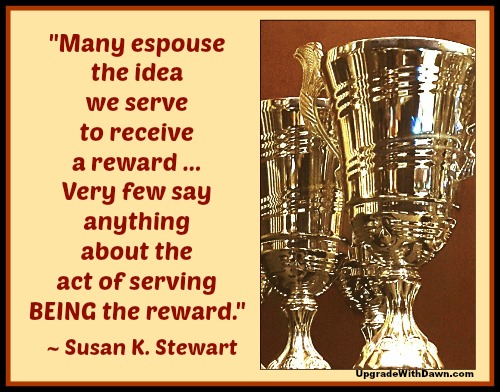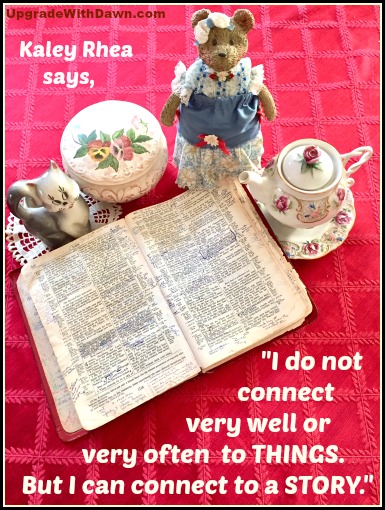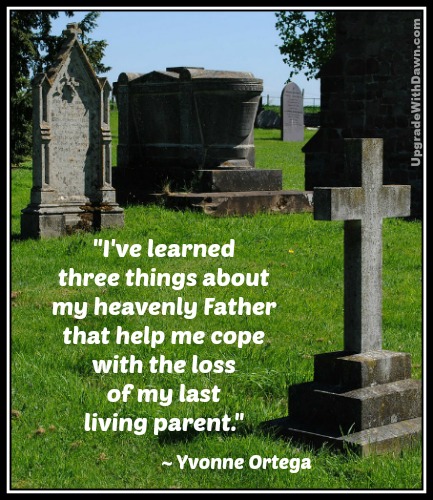Where's My Reward?
Susan K. Stewart is a seriously practical woman who writes books that help writers, teachers and others. I'm guessing she probably doesn't get a lot of praise; but she is a woman of  excellence. In this Service and Ministry UPGRADE, she encourages us to think about service in a fresh way.
excellence. In this Service and Ministry UPGRADE, she encourages us to think about service in a fresh way.
“We know we’re called to serve,” Susan says. “but we don’t think about service as a reward. And that’s something we can cultivate.”
Hmmm.... I (Dawn) don't think I've ever truly thought about service that way.
Susan continues . . .
Anne Steele’s hymn, “Self-Consecration,” was published in 1848*. More than 150 years later, the words of the second verse are a prayer I want to not just say, but also mean.
I will resolve, with all my heart,
With all my powers, to serve the Lord;
Nor from His precepts e’er depart,
Whose service is a rich reward.
The striking part of this verse is not the resolve to serve the Lord and keep his precepts. What my heart clings to is “service is a rich REWARD.”
We know we’re called to serve. Haven’t we heard hundreds of sermons? Read dozens of books on a servant’s heart, servant leadership or service as worship?
Many espouse the idea we serve to receive a reward, whether here or in heaven.
Very few say anything about the act of serving BEING the reward.
Often we think of reward as a tangible item, like a trophy or medal.
I get a humorous picture in my mind of us standing on platforms as God directs the angels to pass out the trophies and medals.
Will there be a pizza party when the ceremony is over?
Among the many definitions of service found in Merriam-Webster Unabridged Dictionary are such things as:
- “the serving of a master,”
- “conduct or performance that assists or benefits someone or something,” and
- “the habit or practice of serving God or the acts done with that intention.”
How do these definitions apply to receiving the reward of service?
“The serving of a master.”
I don’t think any of us would question our service is to our Master, Jesus Christ. The New Testament is full of references to serving God and others. Even Jesus said He came to serve (Mark 10:45).
So we can conclude we are called to serve. God has even given us gifts to use in service to others (I Peter 4:10).
“Conduct or performance that assists or benefits someone or something.”
Service is to assist or benefit someone else.
Again, we look to Jesus for our example. Think about His first miracle, turning water into wine (John 2:1-12). Who benefited? The bridegroom who was lauded for saving the best wine for last. It’s important to note Jesus was not credited with the good wine.
“The habit or practice of serving God or the acts done with that intention.”
Should I say this goes without saying? Our service is to God.
Jesus tells us in the Sermon on the Mount to give in secret, to pray in secret, and fast in secret (Matthew 6:4, 6, 18). He tells us those who do so in public receive a reward from those who see them.
Is it too much of a stretch to think Jesus also wants us to serve in secret?
Paul tells servants to serve heartily as to the Lord, “knowing that from the Lord you will receive the inheritance as your reward” (Colossians 3:23-24). Paul considered his reward to be the ability to share the gospel (I Corinthians 9:12-18).
Neither of these are what we modern believers have come to think of as rewards.
How then do we develop the reward of serving?
1. Consider our gifts.
If God gave us gifts to serve, we need to consider what those gifts are and how to use them to the benefit of others.
Some gifts, such as teaching, are more visible. Certainly a Sunday School teacher is using a gift that all can see to teach others. If that teacher has the edification of the students foremost that is the reward. Other gifts, like intercession, are quiet, unseen. The pray-er uses the gift for the benefit of others.
2. Go where there is a need.
Serving God and others doesn’t mean volunteering at church.
Caring for children or a loved one, going to work daily to earn a family income, or even picking up trash along a roadside are all silent service. This service certainly isn’t glamourous.
It is, however, a reward.
When a call for volunteers is made, don’t rush to heed the call. Sometimes home-grown activities are our call.
3. Pray.
Well, yes, we should pray before entering into service.
Pray that the reward will be the service itself.
Pray to serve as a God-pleaser, not a man-pleaser (Ephesians 6:5-6).
Pray with me to resolve to earn the rich reward of service.
What will you do receive your reward of service?
Susan K. Stewart—when she’s not tending chickens and donkeys—teaches, writes, and edits  non-fiction. Susan’s passion is to inspire readers with practical, real-world solutions. Her books
non-fiction. Susan’s passion is to inspire readers with practical, real-world solutions. Her books  include Science in the Kitchen and Preschool: At What Cost? plus the award-winning Formatting e-Books for Writers. You can learn more at her website www.practicalinspirations.com.
include Science in the Kitchen and Preschool: At What Cost? plus the award-winning Formatting e-Books for Writers. You can learn more at her website www.practicalinspirations.com.
* Steele, Anne. “Self-Consecration.” A Book of Hymns for Public and Private Devotion. (1848).
Graphic adapted, Trophies Photo by Ariel Besagar on Unsplash.
 2 Comments → Posted on
2 Comments → Posted on  Tuesday, June 12, 2018 at 7:05AM
Tuesday, June 12, 2018 at 7:05AM  Reward,
Reward,  Service,
Service,  Service Is Reward,
Service Is Reward,  Serving,
Serving,  Serving God,
Serving God,  Serving Others,
Serving Others,  Susan K. Stewart,
Susan K. Stewart,  Upgrade with Dawn Upgrade Your Life
Upgrade with Dawn Upgrade Your Life  Ministry,
Ministry,  Service
Service 















